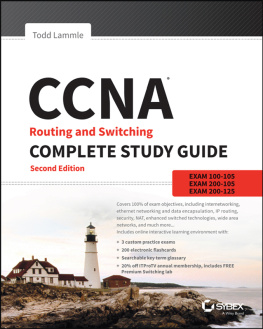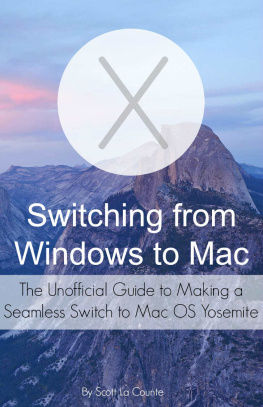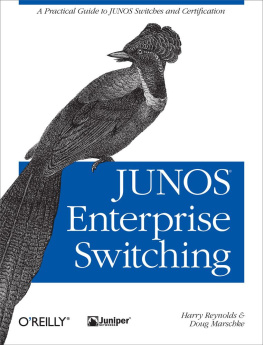Seifert Rich - The all-new switch book the complete guide to LAN switching technology
Here you can read online Seifert Rich - The all-new switch book the complete guide to LAN switching technology full text of the book (entire story) in english for free. Download pdf and epub, get meaning, cover and reviews about this ebook. City: Indianapolis;Ind, year: 2008;2011, publisher: Wiley, genre: Romance novel. Description of the work, (preface) as well as reviews are available. Best literature library LitArk.com created for fans of good reading and offers a wide selection of genres:
Romance novel
Science fiction
Adventure
Detective
Science
History
Home and family
Prose
Art
Politics
Computer
Non-fiction
Religion
Business
Children
Humor
Choose a favorite category and find really read worthwhile books. Enjoy immersion in the world of imagination, feel the emotions of the characters or learn something new for yourself, make an fascinating discovery.
- Book:The all-new switch book the complete guide to LAN switching technology
- Author:
- Publisher:Wiley
- Genre:
- Year:2008;2011
- City:Indianapolis;Ind
- Rating:5 / 5
- Favourites:Add to favourites
- Your mark:
- 100
- 1
- 2
- 3
- 4
- 5
The all-new switch book the complete guide to LAN switching technology: summary, description and annotation
We offer to read an annotation, description, summary or preface (depends on what the author of the book "The all-new switch book the complete guide to LAN switching technology" wrote himself). If you haven't found the necessary information about the book — write in the comments, we will try to find it.
Seifert Rich: author's other books
Who wrote The all-new switch book the complete guide to LAN switching technology? Find out the surname, the name of the author of the book and a list of all author's works by series.
The all-new switch book the complete guide to LAN switching technology — read online for free the complete book (whole text) full work
Below is the text of the book, divided by pages. System saving the place of the last page read, allows you to conveniently read the book "The all-new switch book the complete guide to LAN switching technology" online for free, without having to search again every time where you left off. Put a bookmark, and you can go to the page where you finished reading at any time.
Font size:
Interval:
Bookmark:

The All-New Switch Book: The Complete Guide to LAN Switching Technology, Second Edition
Published by
Wiley Publishing, Inc.
10475 Crosspoint Boulevard
Indianapolis, IN 46256
www.wiley.com
Copyright 2008 by Rich Seifert and Jim Edwards
Published byWiley Publishing, Inc., Indianapolis, Indiana
Published simultaneously in Canada
ISBN: 978-0-470-28715-6
No part of this publication may be reproduced, stored in a retrieval system or transmitted in any form or by any means, electronic, mechanical, photocopying, recording, scanning or otherwise, except as permitted under Sections 107 or 108 of the 1976 United StatesCopyright Act, without either the prior written permission of the Publisher, or authorization through payment of the appropriate per-copy fee to the Copyright Clearance Center, 222 Rosewood Drive, Danvers, MA 01923, (978) 750-8400, fax (978) 646-8600. Requests to the Publisher for permission should be addressed to the Legal Department, Wiley Publishing, Inc., 10475 Crosspoint Blvd., Indianapolis, IN 46256, (317) 572-3447, fax (317) 572-4355, or online at http://www.wiley.com/go/permissions.
Limit of Liability/Disclaimer of Warranty: The publisher and the author make no representations or warranties with respect to the accuracy or completeness of the contents of this work and specifically disclaim all warranties, including without limitation warranties of fitness for a particular purpose. No warranty may be created or extended by sales or promotional materials. The advice and strategies contained herein may not be suitable for every situation. This work is sold with the understanding that the publisher is not engaged in rendering legal, accounting, or other professional services. If professional assistance is required, the services of a competent professional person should be sought. Neither the publisher nor the author shall be liable for damages arising herefrom. The fact that an organization or Website is referred to in this work as a citation and/or a potential source of further information does not mean that the author or the publisher endorses the information the organization or Website may provide or recommendations it may make. Further, readers should be aware that Internet Websites listed in this work may have changed or disappeared between when this work was written and when it is read.
For general information on our other products and services or to obtain technical support, please contact our Customer Care Department within the U.S. at (800) 762-2974, outside the U.S. at (317) 572-3993 or fax (317) 572-4002.
Library of Congress Cataloging-in-Publication Data is available from the publisher.
Trademarks: Wiley, the Wiley logo, and are trademarks or registered trademarks of John Wiley & Sons, Inc. and/or its affiliates in the United States and other countries, and may not be used without written permission. All other trademarks are the property of their respective owners. Wiley Publishing, Inc., is not associated with any product or vendor mentioned in this book.
Wiley also publishes its books in a variety of electronic formats. Some content that appears in print may not be available in electronic books.
To my granddaughter, Annaliese Grace. May she enjoy all of the happiness that life has to offer. I am looking forward to all of the things that she will be teaching me for the many years to come.
Jim Edwards
Credits
Executive Editor
Carol Long
Senior Development Editor
Tom Dinse
Production Editor
Rachel McConlogue
Copy Editor
Nancy Rapoport
Editorial Manager
Mary Beth Wakefield
Production Manager
Tim Tate
Vice President and Executive Group Publisher
Richard Swadley
Vice President and Executive Publisher
Joseph B. Wikert
Project Coordinator, Cover
Lynsey Stanford
Proofreader
PubServices
Indexer
Jack Lewis
Cover Image
Jupiter Images
Preface
The invasion of Local Area Networks (LANs) into the commercial, industrial, university, and even the home environment during the 1980s and 1990s was nothing short of phenomenal. No longer did organizations consider whether they need a network, but only what type of network should be employed and what devices should be used to build the network infrastructure.
Most early LANs were designed around the use of a shared communications channelfor example, a coaxial cable bus. During the late 1980s and early 1990s, two phenomena occurred that would fundamentally change the way that end user LANs were designed:
- LAN topology migrated from the use of a shared medium to standardized structured wiring systems, implemented primarily using unshielded twisted pair (UTP) cable and central wiring hubs.
- End user computing equipment and application requirements advanced to the point where the capacity of a shared LAN could actually limit overall system performance.
These two factors (together with commensurate advances in silicon technology) fostered the development and deployment of LAN switches. While traditional, shared-bandwidth wiring hubs are still in use today, they are generally considered acceptable only at the edge of the network or when application demands do not seriously tax LAN performance. Switches have become almost ubiquitous for backbone interconnections. As switch prices decreased, they became popular even for desktop use, as they can provide performance advantages and growth capability for only a very small premium over their non-switched counterparts.
Along with the power and performance advantages offered by switches comes an increase in features, options, and complexity. This book will guide both network users and product developers through the murky sea of issues surrounding the capabilities, use, and design of LAN switches and switched internetworks.
Who Should Read This Book
This book is aimed at the needs of:
- Network users: This includes network planners, designers, installers, and administrators; MIS management; value-added resellers (VARs); and operations staff in any organization that selects, installs, or uses LAN switches and related network products. This book will help these people to understand and become more comfortable with switching technology and to make informed decisions regarding the selection, purchase, and deployment of LAN switches. In many cases today, these people depend primarily on equipment suppliers as their main source of information. Such information is always suspect, as suppliers have a strong motivation to sell their particular technology regardless of whether it is appropriate or not.
- Network technologists: This includes engineers working for companies involved in the design and manufacture of computers, communications, and networking products; academics (both instructors and students); network product marketing and sales personnel; independent consultants; and anyone interested in understanding LAN switch operation beyond the level of detail typically available in product data sheets, trade journals, and general networking books.
The reader is assumed to be at least casually familiar with computer networks (in particular, Local Area Networks), network protocols, and common network application environments. No attempt is made to provide a complete, from-the-ground-up tutorial suitable for novices. Indeed, such a work would require an encyclopedia and would make it impossible to focus on the critical issues of LAN switching. Network technologists and users grounded in network fundamentals will learn everything they need to completely understand the workings of LAN switches. In the process, they will gain enormous insight into the reasons why things are done the way they are, rather than just getting a presentation of cold facts.
Font size:
Interval:
Bookmark:
Similar books «The all-new switch book the complete guide to LAN switching technology»
Look at similar books to The all-new switch book the complete guide to LAN switching technology. We have selected literature similar in name and meaning in the hope of providing readers with more options to find new, interesting, not yet read works.
Discussion, reviews of the book The all-new switch book the complete guide to LAN switching technology and just readers' own opinions. Leave your comments, write what you think about the work, its meaning or the main characters. Specify what exactly you liked and what you didn't like, and why you think so.

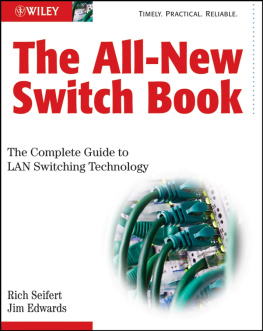


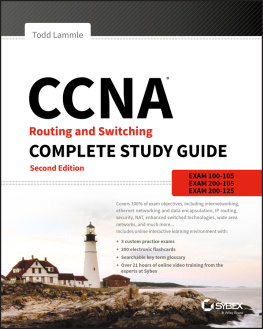

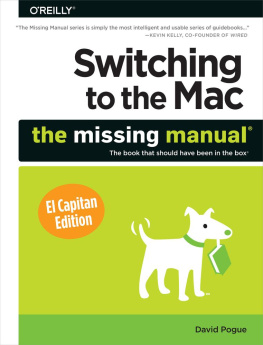
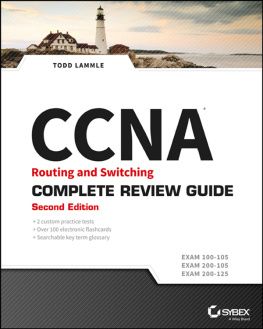
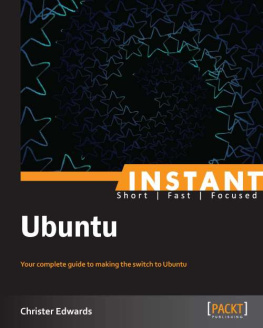
![switching.social [switching.social] - The Switching Social Handbook](/uploads/posts/book/131346/thumbs/switching-social-switching-social-the-switching.jpg)
